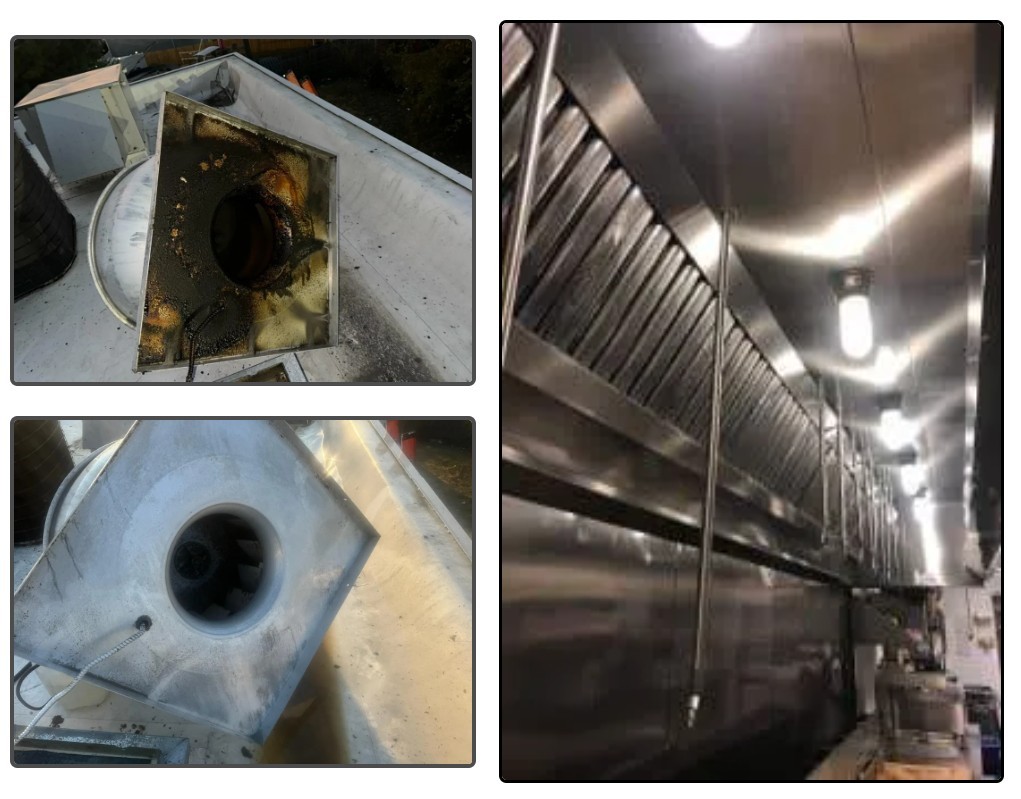
Why Kitchen Hood Cleaning is Essential for Safety
A well-maintained commercial kitchen is crucial for safety, efficiency, and compliance. One of the most overlooked aspects of kitchen maintenance is the kitchen hood cleaning service. A neglected exhaust system can lead to serious fire hazards, poor air quality, and regulatory fines. If you operate a restaurant, hotel, hospital, school, or any commercial kitchen, keeping your hood clean isn’t just about hygiene—it’s about safety.
Ignoring proper hood maintenance can put employees, customers, and your business at risk. But how do you know when it’s time to schedule a professional cleaning? Here are the key signs that your kitchen hood needs immediate attention.
Signs Your Kitchen Needs a Professional Hood Cleaning
1. Grease Buildup in and Around the Hood
Grease is a byproduct of cooking, and over time, it accumulates inside the hood, ductwork, and exhaust fans. If you notice a sticky, greasy layer forming around your hood or dripping onto surfaces, it’s time for a cleaning. Grease buildup is highly flammable and can ignite with a single spark.
What to Look For:
- Visible grease stains on the hood or walls
- Grease dripping from the exhaust fan
- Thick grease deposits in the filters
A professional kitchen hood cleaning service will remove grease from all hidden areas, reducing fire risks.
2. Strong Odors in the Kitchen
A properly functioning hood system should remove smoke, steam, and food odors. If your kitchen smells greasy or smoky even after cleaning, your exhaust system may be clogged.
What This Means:
- The ventilation system isn’t effectively removing airborne grease and smoke
- Grease accumulation inside the ducts is trapping odors
- The filters are clogged and need cleaning or replacement
3. Visible Smoke or Poor Airflow
Have you noticed smoke lingering in the kitchen longer than usual? Poor airflow can be a sign that your exhaust system is struggling. A clogged or dirty exhaust fan won’t efficiently pull smoke and heat out of the kitchen, leading to unsafe working conditions.
What to Watch For:
- Smoke not venting properly
- Increased heat in the kitchen
- Employees experiencing breathing issues or discomfort
Professional cleaning restores proper airflow, making your kitchen a safer and more comfortable place to work.
4. Higher Energy Bills
A dirty exhaust system works harder to remove smoke and heat, causing your energy bills to rise. If your utility costs have spiked without a clear reason, your kitchen hood could be the culprit.
Why This Happens:
- Grease buildup reduces fan efficiency
- Clogged filters force exhaust fans to use more energy
- Air circulation is restricted, making your HVAC system work harder
A thorough kitchen hood cleaning service can improve efficiency, lowering your energy costs.
5. Frequent HVAC or Exhaust Fan Repairs
If your exhaust fan or HVAC system needs constant repairs, grease buildup may be to blame. Excess grease can damage motor components, clog ducts, and reduce the lifespan of your equipment.
Signs of Damage:
- Exhaust fan making unusual noises
- HVAC system struggling to maintain temperature
- Increased maintenance costs
Regular hood cleaning keeps your ventilation system in top condition, preventing costly breakdowns.
6. Failed Fire or Health Inspections
Fire marshals and health inspectors check kitchen hoods for compliance with kitchen exhaust hood cleaning certification standards. If your kitchen has failed an inspection or received a warning, it’s crucial to address the issue immediately.
What You Could Face:
- Fines or penalties for non-compliance
- Possible kitchen shutdown
- Increased fire risks
A professional cleaning service ensures your kitchen meets all safety regulations.
The Benefits of Professional Kitchen Hood Cleaning
Reduces Fire Hazards
According to the National Fire Protection Association (NFPA), grease buildup is a leading cause of commercial kitchen fires. Regular cleaning removes flammable residues, significantly lowering fire risks.
Improves Air Quality
A clean exhaust system efficiently removes smoke, steam, and grease particles, creating a healthier work environment. Employees and customers benefit from fresher air and better ventilation.
Ensures Compliance with Regulations
Commercial kitchens must meet strict fire and health codes. Hiring a certified kitchen hood cleaning service ensures your business stays compliant, avoiding fines and penalties.
Extends Equipment Lifespan
Proper maintenance prevents grease-related damage, reducing wear and tear on exhaust fans, ducts, and HVAC systems. This leads to fewer breakdowns and lower repair costs.
How Often Should You Schedule a Hood Cleaning?
The frequency of cleaning depends on your kitchen’s volume and type of cooking:
- High-volume kitchens (fast food, 24-hour diners): Every 1-3 months
- Moderate-use kitchens (casual dining, hotel restaurants): Every 6 months
- Low-use kitchens (churches, seasonal kitchens): Once a year
Following NFPA guidelines ensures your kitchen remains safe and compliant.
Choosing the Right Kitchen Hood Cleaning Service
Not all cleaning services provide the same level of expertise. Here’s what to look for:
- Certifications: Ensure they meet NFPA 96 and kitchen exhaust hood cleaning certification standards.
- Experience: Look for companies specializing in commercial kitchen cleaning.
- Comprehensive Cleaning: They should clean ducts, fans, and filters, not just the visible areas.
- Reputation: Read customer reviews and ask for references.
A trusted company like MidAtlantic Hood & Duct Cleaning provides thorough, regulation-compliant services, keeping your kitchen safe.
Final Thoughts: Don’t Wait for a Disaster
Neglecting your kitchen hood can lead to fires, health hazards, and costly fines. If you notice grease buildup, poor airflow, or strange odors, it’s time to schedule a professional kitchen hood cleaning service. Regular maintenance ensures safety, efficiency, and compliance, protecting your business and everyone inside it.
Make hood cleaning a priority today to avoid bigger problems tomorrow.